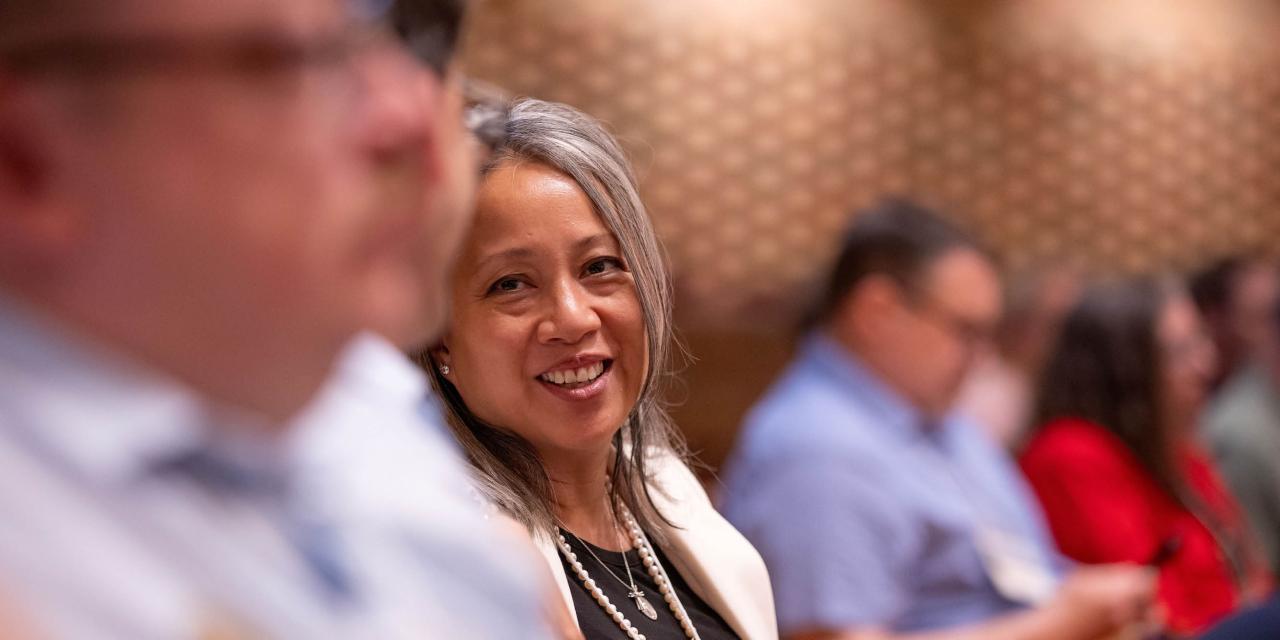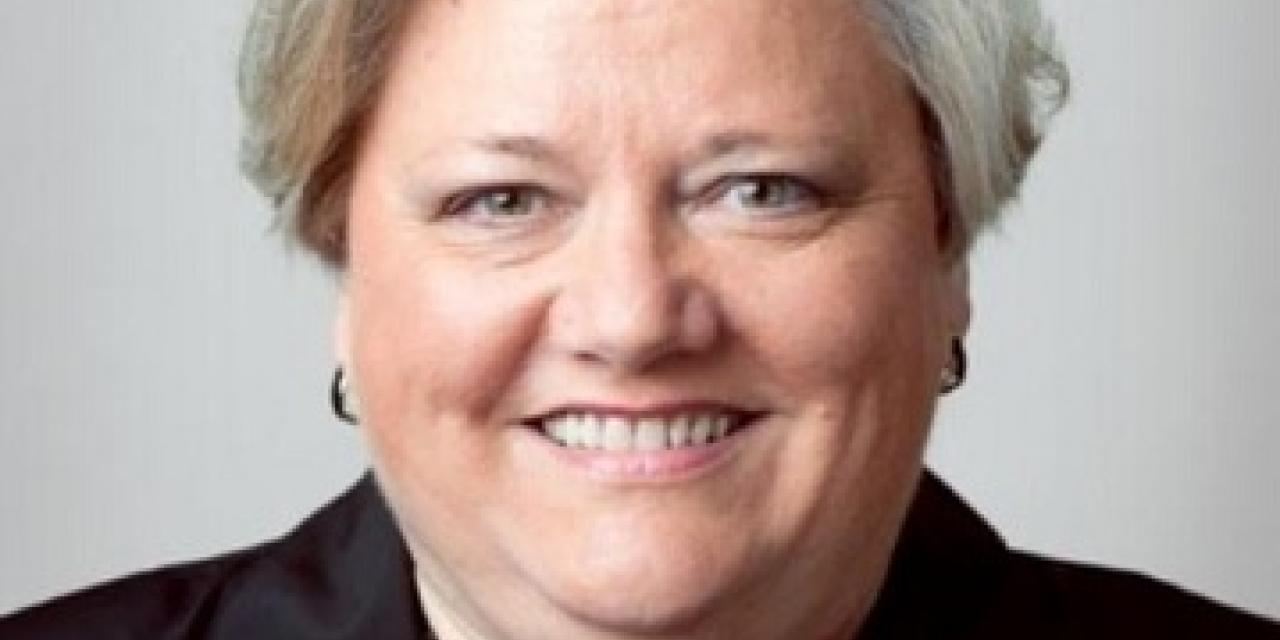Constance Cherry teaches worship and pastoral ministry at Indiana Wesleyan University in Marion, Indiana. She also writes books and hymns, speaks at conferences, and serves as pastor at Grant United Methodist Church. In this edited conversation, she talks about an approach to worship that gives her small congregation a missional identity.
How would you describe Grant United Methodist Church (UMC) and its surrounding community?
It’s a small church at the corner of a cornfield. We average about 25 to 30 people in worship and have no young families. Our church identifies itself as “evangelical” and has a mix of former farmers and former and active school teachers and business people. Like Fairmount, the nearest village, we’re 100 percent European-American (Anglo). By one measure, we are aging and in decline, but we love each other and have a sense of purpose. We’ve come to see ourselves as “the church in your corner.”
How long have you served as pastor?
I was appointed in 2005 and served till 2010, when I asked to step down because I was getting so many requests to teach and speak on my book The Worship Architect: A Blueprint for Designing Culturally Relevant and Biblically Faithful Services. I wasn’t pursuing those opportunities; they pursued me.
In 2015, Grant UMC asked the district superintendent to ask me to come back. I wasn’t sure whether I could manage, so I did it as a trial. We go year by year, and I’m still here. Pastoring on top of everything else I do is a lot, but the partnership is working. Ministering with this congregation is such a blessing.
And how do you manage, given that you’re a professor, author, and speaker?
I am considered one-quarter to one-half time. I preach, plan and lead weekly worship, preside at the sacraments, do pastoral care but no counseling, do required local and denominational administration, and help with mission visioning. I have a very clear job description that includes Sundays away for preaching, teaching, and research.
I give the congregation a lot of credit, because they are very generous. We have very solid and willing laypersons who carry out most of the church’s work.
In what ways has your congregation’s understanding of worship changed or deepened?
They see worship as a tri-directional dialogue. Worship is relational at its core. Seeing worship as a conversation—God to us, us to God, and us with others—helps us understand God as relational. This understanding has helped us gain a sense of Christ’s true presence in the gathered community.
Our people participate in songs, prayers, Scripture, and response to the word. They create a warm, friendly community that extends beyond the people gathered for worship. They’ve also gained a greater awareness of the story of God through practicing the Christian year more fully. We follow all the seasons and many key days, but not in an exhaustive way.
What is the relationship between sound worship practices and hospitality?
Every church thinks they’re a friendly church, although perception doesn’t always match reality. However, I believe we have a very hospitable congregation before, during, and after the worship service. By intentionally alternating vertical and horizontal worship elements, we communicate a sense of importance and belonging that results in “before and after” friendliness. The greeting and dismissal work together to convey God’s hospitality to us, our response to that invitation, and our extending God’s hospitality to others.
How did these worship and hospitality changes come about at Grant UMC?
I have the advantage of being able to integrate theory and practice every week. As a professor of worship and pastoral ministry, I can go beyond teaching theoretical understanding of worship to actually doing it week after week in the local church. Yet, I in no way wish to take credit for the changes, because the people embrace them eagerly. Our service is not formal, but neither is it hokey. It’s planned but not rigid. People are full participants all the way along.
What’s an example of a worship practice that helps your people extend hospitality beyond the church doors?
We view intercessory prayer as very important. This includes not only needs within our congregation but also local, national, and international needs. For example, on the Sunday after the October 2018 killings in a Jewish synagogue in Pittsburgh, I asked for prayer requests as I most often do. Then I said, “God is with us and hears your concerns. And I want us to all pray about these things during the week. But today we will devote our entire intercessory prayer for that great loss at the synagogue.”
I sometimes invite people to come forward and kneel at the prayer kneelers at the front of the church for prayer. Some do, some don’t. Sometimes there is anointing with oil. I may leave space in the prayer for directed silent prayer, or for others to lift their spontaneous prayers. Occasionally I call on someone to pray. Hospitality isn’t only being friendly; hospitality is opening ourselves to the needs of people whether inside or outside of our local church
Who plans and leads worship at Grant UMC?
Because we’re a very small church and I don’t have church office hours, I still plan most of the worship. However, our accompanist and lead musician participates with me informally, and she’s totally responsible for planning and leading worship at least six times per year. She is pretty specific in telling me that she is getting better at understanding the content and order of the service. She and I are a team, definitely. I have also developed others to lead prayer, read Scripture, and give a testimony. I want to expand in this area.
What’s the music like in your services?
A member recently told me that she really appreciates how our services use a variety of music in different ways. We use the UMC hymnal most often, but also do a fairly wide variety of other songs. For example, often we use praise and worship music as a call to worship or response to prayer. We also commonly weave verses of a single song throughout the service. Our people sing with great energy and devotion. I appreciate that about them. We’re a singing church.
Given the average age of your members, does congregational life feel like a fight for survival?
The congregation lost young families while I was away. When I returned in 2015, they asked for me to focus for the first year on healing and stabilization. But these people are very missional, so we devoted the second year to discovering God’s purpose for Grant UMC. We have an inward ministry team and an outward ministry team. The outward team had conversations at the schools, fire department, police department, and so on, asking what they needed. We didn’t want to duplicate what’s already being done. The outward team would report back, and we’d all pray for discernment on how to serve and give.
What did you discover?
Grant County is rural and one of the poorest counties in Indiana. People struggle with drugs, crime, and unemployment. We learned that the elementary school already had help, but the junior and senior high school did not. The superintendent, principal, and guidance counselor said, “Kids’ needs for food, back to school supplies, and fees for special classes don’t end at sixth grade.” We believe God has led us to focus our local community mission on the junior and senior high schools.
So now we take offerings for the high school art and science programs. One class needed ear buds for a part of the curriculum, so we bought those. Our congregation includes generations of women who prefer homemade goodies. They make sure every teacher and administrator starts the year with a supply of home-baked cookies and encouraging notes. We throw a Christmas party for the teachers and staff to thank them for their work in the community and to build relationships.
We also have card parties, where we handwrite messages like “You can do this. God loves you. We are praying for you.” We deliver the cards to the guidance counselor, so, when a kid has a really bad day, the counselor can pull out a card.
Your own life is so busy. Why do you keep pastoring at Grant UMC?
The main reason I do so is because my call to ministry includes the combination of local church ministry and teaching. I’ve served on staff in much larger churches and taught part time. For many years, I have taught full time and served a small church. I actually find great joy in serving small churches. There’s a different sense of community and appreciation for one another. I don’t solicit my Indiana Wesleyan University students to come to our church, but some seek out this congregation, because they prefer a small church.
One student, who was with us for three years, would sometimes lead prayer, do the call to worship, and help serve Holy Communion. We enjoyed giving her ministerial opportunities to get a footing. Now she’s at Duke Divinity School. In fact, our people would like us to be a training church for more students interested in ministry. Small churches can give developing future ministers a great place to gain experience as they bring theory and practice together.
LEARN MORE
Read Constance Cherry's books about designing worship services, special services, and music that engage worshipers in song.

